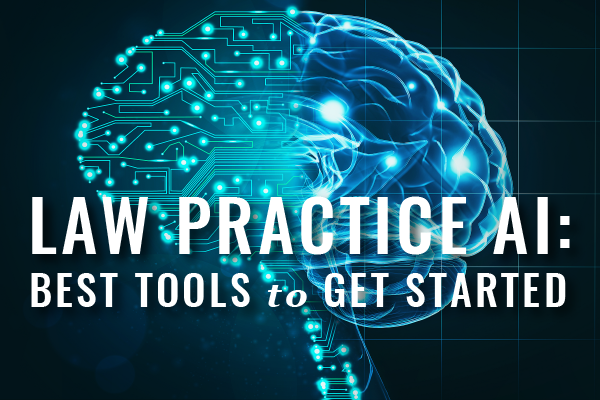AI can reduce your workload as a lawyer — but only if you start using it in your law practice. Find more on 5 top time-saving tools here.
At its core, artificial intelligence aims to mimic the cognitive functioning of humans to complete tasks that traditionally could only be accomplished by humans. In doing so, AI can do these tasks faster and with greater precision. For a law firm, this creates efficiencies and provides better, faster, and more reliable service to clients. While there is a lot of hype surrounding AI and, I confess, much unknown, it behooves law firms and attorneys to consider AI’s benefits and how to use it in practice. Turning a blind eye certainly won’t benefit your law firm nor will it help stop the robot lawyers from world domination.
No longer pie in the sky, AI can now assist lawyers with document review, proofreading, research, time capture, email, and more. Believe it or not, AI doesn’t need to be as expensive and sophisticated as a self-driving car. It can be as cheap and simple as an iPhone app. Moreover, it is likely that one of your competitor firms is already taking advantage of this technology. To get sense of what AI could be doing for your practice, let’s take a look at a sampling of the many products currently on the market. These are products that you could very well implement into your practice tomorrow.
CARA by Casetext. CARA or “Case Analysis Research Assistant” is a no brainer for litigators. By simply uploading a brief, memo, and other legal document to the platform, this AI tool will analyze the citations and return a list of “suggested cases” that are relevant to, but not cited in the document. CARA reviews and analyzes the contents of the brief and then uses a proprietary algorithm to search its own database of legal documents, statutes, opinions, and articles to find similar on-point cases. Having once been a litigation associate, I would have paid for this product out of my own pocket. In fact, law students are already utilizing these platforms – Boston College Law Library encourages students to take advantage of CARA and other tools via resources recommended on their website: http://lawguides.bc.edu/citecheckingtools.
ROSS by ROSS Intelligence, Inc. ROSS touts itself as your “On-Demand Research Associate”. ROSS uses machine learning to fine tune research methods and to hone in on answers to substantive legal issues focused in the areas of bankruptcy, intellectual property, and labor and employment law. ROSS relies in part on IBM Watson’s natural language processing to search and provide legal information, including citations, case excerpts, and briefs in response to legal inquiries.
Zero. This iPhone app uses AI to automatically capture, analyze, and prepare reports on time spent on client-related work; and applies AI to sort and file emails. Zero helps recover lost billable time, saves hours spent processing emails, and reduces errors in email filing.
Docubot by 1LAW. Rather than spend the time asking a series of questions to your client and then using that information to draft a legal document, Docubot does the work for you. This chatbot resides on your website and through a Q & A interface interacts with the user (a client) to prepare a legal document that can then be reviewed by a human attorney.
Docket Alarm. This program makes it easy to monitor your court filings by giving you central access to federal and state court filing systems. You can receive automated alerts on cases and receive new case filings within a single email. Docket Alarm’s real AI functionality, however, is in its predictive outcome technology which analyzes aggregate data in the platform to give lawyers insights on how judges have ruled on similar matters, which parties settle most and at what stage, and other helpful strategic case data.–
Expect your competitors to start using artificially intelligent tools if they aren’t already, and expect to see more of these types of products come to market. Some firms are even building their own AI platforms tailored to their practice and clients. AI is no longer the future, it is the present. Whether you are a solo practitioner or large firm partner, it’s time to focus on how you use AI.
. . .
This article was originally published in the Massachusetts Lawyers Journal, Volume 25, Number 4 (March/April 2018) as “Artificial Intelligence – it’s not just a passing fad”.




